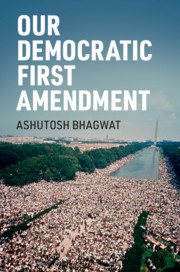Book contents
- Our Democratic First Amendment
- Our Democratic First Amendment
- Copyright page
- Dedication
- Contents
- Acknowledgments
- Introduction
- Part I The Framers’ Democratic First Amendment
- Part II The Democratic First Amendment in the Age of Twitter
- 5 Cacophony: Speech and Press in the Internet Era
- 6 DeSiloing: Of Civic Associations, Book Clubs, and Taverns
- 7 Why Assembly and Petition Still Matter
- Conclusion
- Index
6 - DeSiloing: Of Civic Associations, Book Clubs, and Taverns
from Part II - The Democratic First Amendment in the Age of Twitter
Published online by Cambridge University Press: 28 May 2020
- Our Democratic First Amendment
- Our Democratic First Amendment
- Copyright page
- Dedication
- Contents
- Acknowledgments
- Introduction
- Part I The Framers’ Democratic First Amendment
- Part II The Democratic First Amendment in the Age of Twitter
- 5 Cacophony: Speech and Press in the Internet Era
- 6 DeSiloing: Of Civic Associations, Book Clubs, and Taverns
- 7 Why Assembly and Petition Still Matter
- Conclusion
- Index
Summary
Chapter 6 examines the evolution of associational freedoms from the time of de Tocqueville through the modern era. It begins by discussing the myriad ways in which even nonpolitical associations, organized around a vast variety of topics and causes, helped shape our democracy from the nineteenth through much of the twentieth centuries. Such groups helped politically marginalized individuals such as women and minorities to develop the organizational and leadership skills needed to participate in political life. They also were vehicles that, given a push, could evolve to pursue political objectives. And importantly, such associations permitted citizens possessing a diversity of social and political views to mingle and exchange thoughts. Recently, however, as Robert Putnam has extensively shown, civil society in the United States has collapsed. Instead of participating in broad associations, people are increasingly siloed into narrow groups with shared political and social values, a process that the Internet and social media have vastly exacerbated. The chapter concludes by exploring how certain surviving associations – notably book clubs and beer groups – might present a pattern for how we might bring about an associational revival, and how the Internet might become a tool rather than a barrier in that quest.
Keywords
- Type
- Chapter
- Information
- Our Democratic First Amendment , pp. 119 - 139Publisher: Cambridge University PressPrint publication year: 2020

